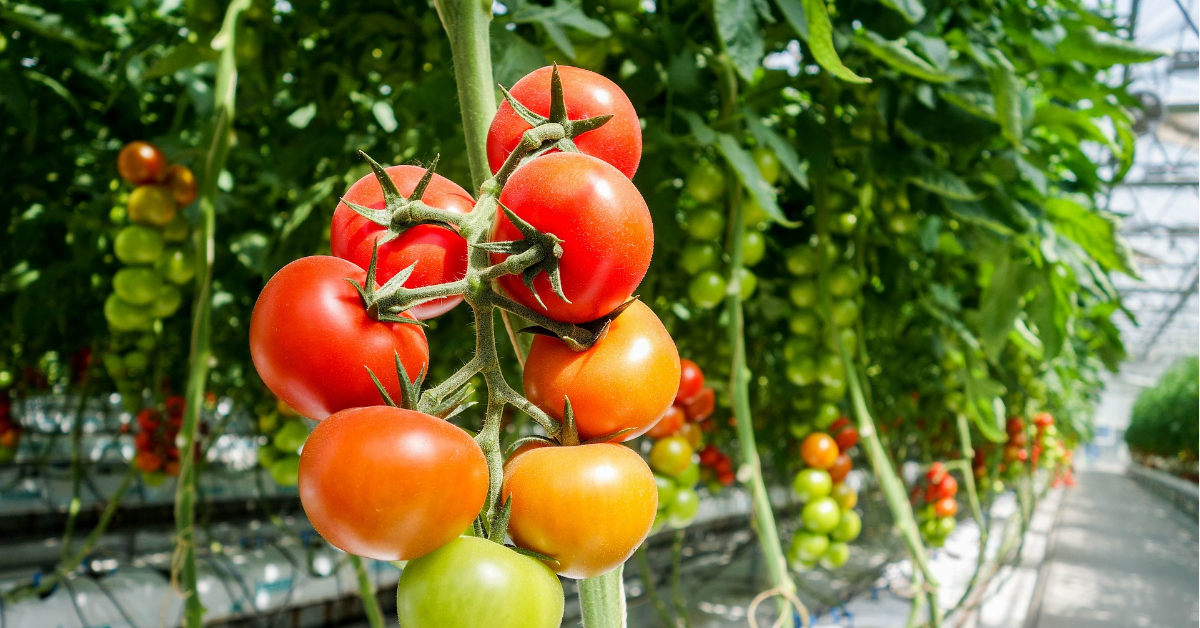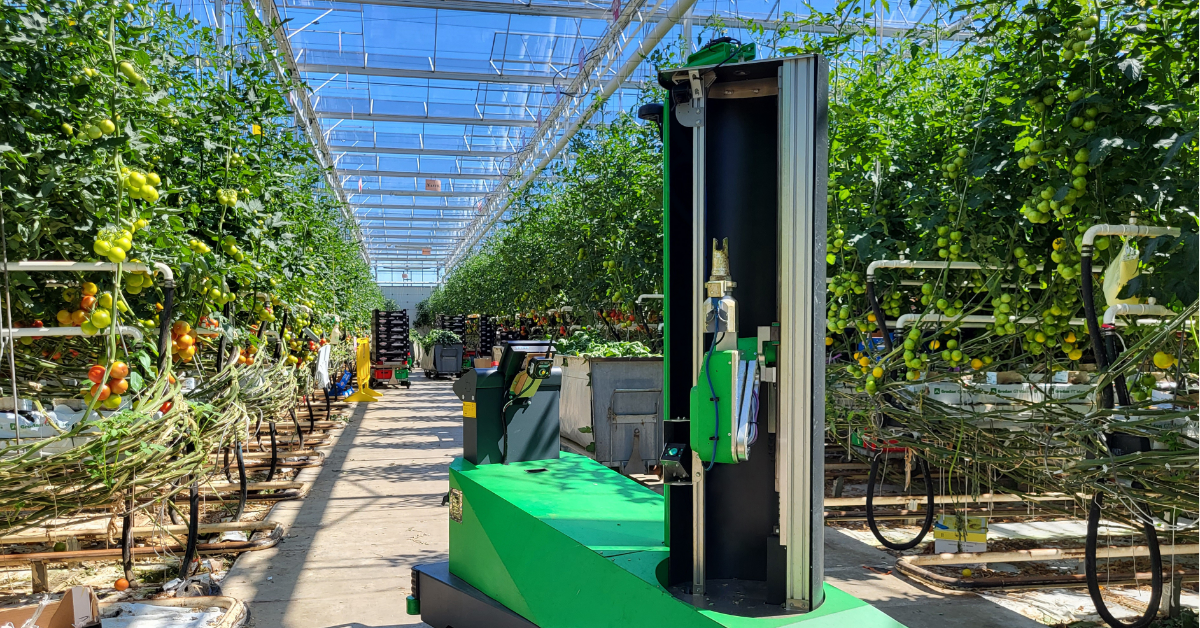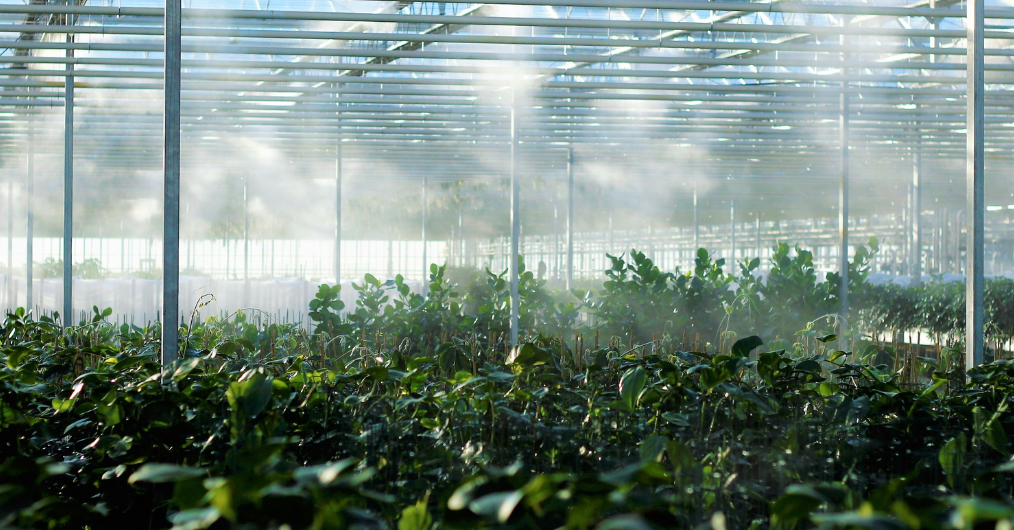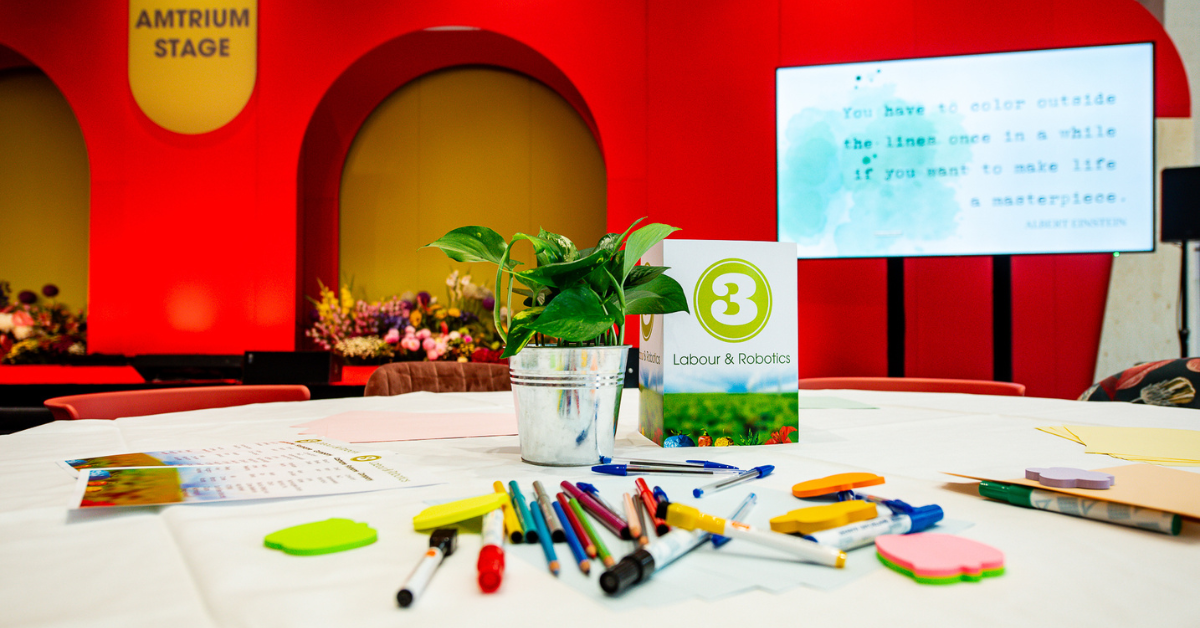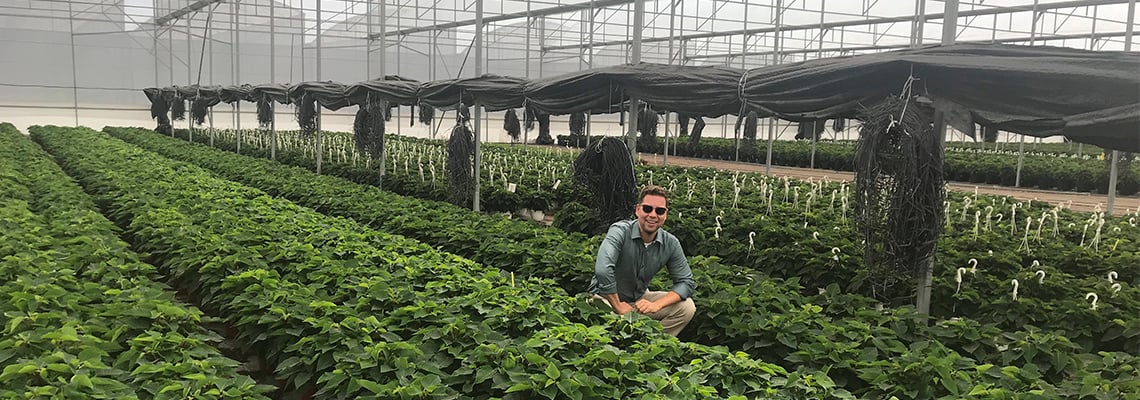Greenhouse horticulture in Mexico has grown enormously in recent years. Intensive knowledge sharing between Dutch and Mexican companies, knowledge and government institutions played a key role in this.
Mexican horticulture is experiencing an upsurge: in 2003 protected horticulture covered 132 hectares. In 2018 that area had increased to 51,000 hectares or almost 400 times as much! The greenhouses mainly grow tomatoes, cucumbers and bell peppers, the majority for export to the US and Canada. Major protected horticulture areas are situated in the states of Sinaloa, Jalisco and Michoacán, where mostly low-tech systems such as shadow nets and macro tunnels are used. The state of Querétaro, situated at a relatively high elevation with colder temperatures, mainly has greenhouses of a mid to high-tech character. In recent years, several Dutch companies have also established themselves around the city of Querétaro that have actively contributed to the development of this sector.

Close cooperation exists with the Mexican company United Farms on Next Generation Growing.
Photo: Horticonnect
Knowledge of high-tech horticulture
Finding suitable workers for Mexican high-tech horticulture is often a challenge. Young people are increasingly disinterested in the agricultural sector and Mexican education provides agronomists with basic knowledge, but generally no knowledge of issues such as data, climate control, fertilization, etc. that is necessary for high-tech horticulture. Dutch companies and institutions do have this knowledge and are very active in meeting the demand in collaboration with Mexican partners.
Next Generation Growing
A good example is the Dutch business consortium Horticonnect that consists of Dutch companies that provide complementary greenhouse technology and services to Mexican growers, and jointly promote ‘Next Generation Growing’ in Mexico. Plant Empowerment plays a central role in this. “Plant Empowerment is an integrated approach to sustainable greenhouse production”, says Natascha Faessen, marketing specialist at consortium member Hoogendoorn Growth Management. “The basis of this approach is to stimulate and support the natural growing power of plants by creating optimum conditions for them. Ultimately, this also contributes to a more efficient and therefore more sustainable use of scarce resources such as water, energy, minerals and fertilizers.”
Horticonnect works closely with the Mexican company United Farms in promoting ‘Next Generation Growing’. The company manages 65 hectares of greenhouses in Querétaro. Robert van der Geest, Chief Operating Officer at United Farms: “We have set up sensors, cameras, computers and screen installations from Dutch companies on ½ a ha of greenhouse. Data is collected continuously there and shared with our Dutch partners. In addition, there is weekly contact with a crop adviser from Koppert, who analyses the data from the Netherlands and, based on this, proposes adjustments in the field of climate control, fertilisation or water supply. We also meet with all partners once a month to determine our strategy". Improvements in quality and productivity can already be observed.
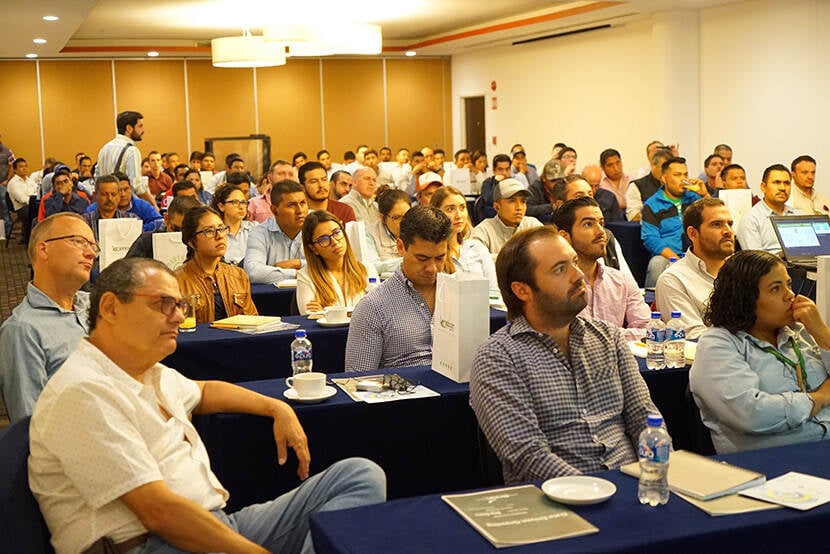
Mexican growers are increasingly interested in knowledge about Dutch technology.
Photo: Horticonnect
Seminars
The resulting knowledge is not limited to the participating companies. Seminars are regularly organised, partly with financing from the RVO Partners for International Business (PIB) programme, to share ‘Next Generation Growing’ experiences with Mexican growers. These seminars are becoming increasingly popular – over 100 growers from all over Mexico came to the last seminar in September 2019 – and are expected to increase demand from Mexico for Dutch technology.
Building on this success, an RVO funded 'Train the Trainer' project will start in 2019, in which 10 Mexican trainers will – over the course of a year – be trained in ‘Next Generation Growing’. These trainers will in turn train local growers, managers and technical staff transforming them into ambassadors of this Dutch approach.
'Various parties would like to see a Mexican version of the Dutch World Horti Center’
From greenhouse drain water to Omega-3 eggs
United Farms is also one of the partners in the ‘Algaelinkages’ project. In this project, partly financed by the Dutch government, Dutch and Mexican companies as well as research institutions (including WUR, van Hall Larenstein and the Universidad Autónoma de Querétaro) are jointly developing a fully integrated and sustainable chain of greenhouse drain water for the production of microalgae as chicken feed for Omega-3 enriched eggs.
Project leader and WUR researcher Lolke Sijtsma explains the importance of this project: “In contemporary Mexican greenhouses, much of the water used drains off without nutrient scrubbing. This aggravates the water scarcity problem that Mexico faces. In addition, the residual fertilizers in the water cause major groundwater quality problems. Easy reuse of drain water from the greenhouses is impossible without further treatment due to the salt content. Microalgae are a perfect solution to this problem: they can grow in this drain water, using the remaining nutrients thereby cleaning the water. Subsequently, these microalgae are a good source of essential Omega-3 fatty acids. Adding these healthy fatty acids to chicken feed benefits both the health of the chicken and that of the consumer of the enriched egg”. This project is also a prime example of the circular approach advocated by Ministry of LNV [Agriculture, Nature and Food Quality].

Students at Mexican training institute Ceickor also intern at horticultural companies.
Photo:CEICKOR
Training institute Ceickor
Querétaro is also home to the CEICKOR horticultural production and training institute. CEICKOR originated in 2010 from an alliance between the Mexican Rapel and the Mexican branch of Dutch company Koppert with the aim of providing the rapidly developing Mexican greenhouse horticulture sector with the necessary knowledge. Koppert is not the only Dutch company to play an important role at CEICKOR. Greenhouse technology company Priva is also closely involved. CEICKOR Director Felix Tarrats: “Academic institutions, not only in Mexico, but also in the Netherlands, are often too far removed from reality and don’t always meet the practical needs of growers. CEICKOR wants to meet these needs and ultimately transform Mexico through education.”
A unique feature of CEICKOR is the close cooperation between education and business: 70% of the approximately 75 students receive a scholarship from a company run fund. Students subsequently have internships at these companies and many of them continue to work there afterwards.
Cultural change in crop protection
The Mexican branch of Koppert, a global leader in biological crop protection and a knowledge company par excellence, has developed into a company with 150 employees. Since coming to Mexico in 1994 it has witnessed the spectacular growth of Mexican horticulture first hand. It not only grew with the sector, but also influenced its development, says communications manager Eduardo Tapia: “Mexican growers knew little to nothing about the benefits of natural pollination. The transition from manual to natural pollination by bumblebees was a cultural change partly brought about by Koppert, and heralded the start of a considerable reduction in the use of pesticides. In 1994, we started with 10 people who travelled the country giving workshops. Currently there are over 50 advisers in our information department alone, who advise growers throughout Mexico. In addition, we organise courses for a wider audience, and contribute to conferences, university study programmes, etc. In August, we opened our demonstration greenhouse at CEICKOR, where we share our knowledge of biological crop protection with growers from all over Mexico.”
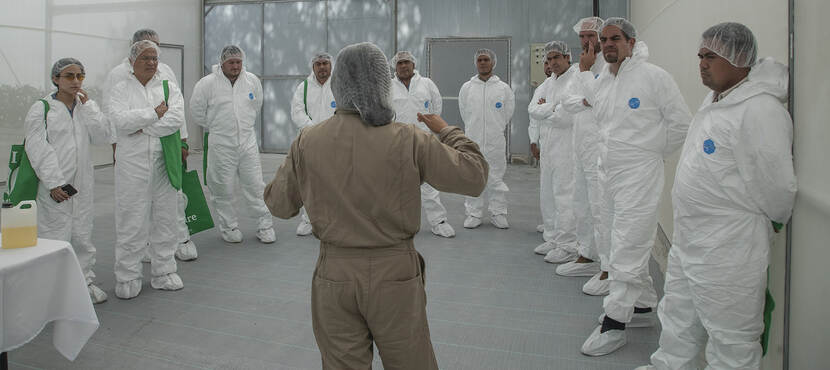
Demonstration greenhouse on the Ceickor training institute’s site.
Photo: Ceickor
Knowledge from Mexico to the Netherlands
Knowledge not only flows from the Netherlands to Mexico, but also vice versa. An example is knowledge about combating the pepper weevil that lays eggs in the bell pepper buds after which its larvae devour them. The pest originally only occurred in Central and North America. Mexico was a pioneer in combating the pepper weevil and Koppert Mexico has developed a handbook for this together with the Mexican agricultural university Chapingo. That knowledge came in handy when a few years ago this pest also appeared in Dutch bell pepper cultivation.
The knowledge generated at United Farms both in the fields of Next Generation Growing and as part of the algae project also flows back to the Netherlands. “The conditions for algae cultivation are better in Mexico than in the Netherlands and Mexico has good experience and knowledge in this area, says Robert van der Geest. WUR is currently learning from our experiences at United Farms, for example about the optimum light and temperature conditions for algae growth and Omega-3 concentrations".
Knowledge networks
Koppert prefers to speak of knowledge generated in networks than knowledge flowing from country A to B. Koppert has a crop team for every crop. In a crop team Koppert staff from around the world meet, virtually or physically, to share knowledge and experience with the crop protection issues of that specific crop, thereby gaining new insights.
Future opportunities
Almost everyone agrees that there are still untapped opportunities in the field of knowledge: various parties would like to see a Mexican version of the Dutch World Horti Center at which government, business and knowledge institutions cooperate closely to innovate the Mexican greenhouse horticulture sector. Felix Tarrats sees more opportunities in direct knowledge exchange between Mexican and Dutch growers. Whilst Koppert emphasises the importance of closer cooperation with the government: for example, new knowledge about crop protection should also lead to regulations on (and the prohibition of) certain pesticides, which are currently still permitted in Mexico. What is certain is that knowledge will continue to play an essential role in the further development of the Mexican horticultural sector.
[Source: This article was written by Erik Plaisier. You can read the original Dutch version here »]
The first edition of GreenTech Americas
On 24, 25 and 26 March 2020, the first edition of GreenTech Americas will take place in Santiago de Querétaro, Mexico. For 3 days, regional and international market leaders will come together to network, and discuss the challenges in the industry. Alongside the exhibition, a special conference will take place, where experts share their knowledge on investment opportunities, new technologies in horticulture and much more.
Read about GreenTech Americas 2020 »
Want to know more?
.png?h=628&iar=0&w=1200)
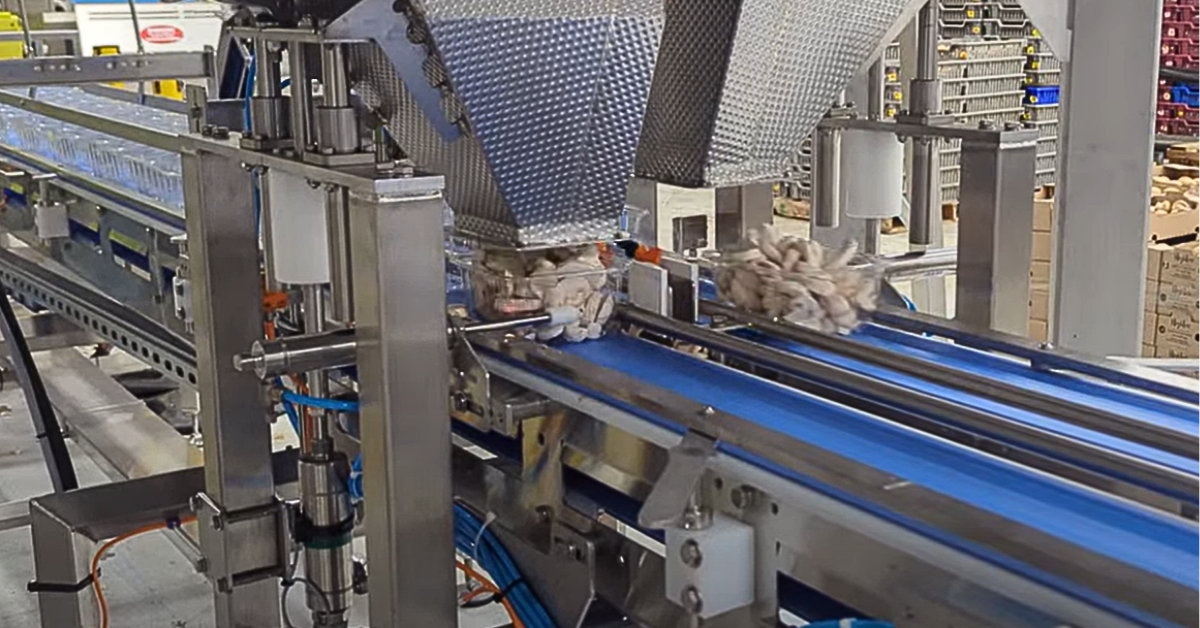
.png?h=628&iar=0&w=1200)

